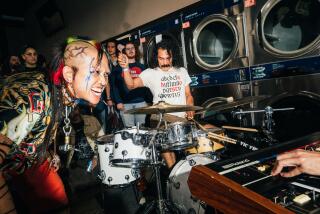Lorna Doom, unsung hero and founding member of L.A. punk band Germs, has died
- Share via
The first documented onstage performance by L.A. punk bassist Lorna Doom, whose death was announced Wednesday, resulted in her and her Germs bandmates promptly getting booted from the stage.
“Darby stuck the mike in a jar of peanut butter. We made noise for five minutes and then they threw us off,” recalled Germs guitarist Pat Smear, who co-founded the band with Doom and singer Darby Crash and is now a member of Foo Fighters.
Born Teresa Ryan, Doom became an icon of the U.S. punk explosion despite having to learn her instrument after already joining the band. Along with her high school friend Belinda Carlisle, who would become lead singer of the Go-Go’s, the bassist was part of the posse of Hollywood punks who sparked a West Coast music movement.
Doom’s death at age 61 was confirmed by her longtime friend and former Germs bandmate Don Bolles.
On Friday, Foo Fighters representatives issued a statement on behalf of Ryan’s family and revealed the cause of death.
“Teresa Ryan a/k/a Lorna Doom was always a woman of mystery. So much so, that even in her final days as she fought a tough, year-long battle with cancer, very few people even knew she was ill,” the statement read.
“She kept a very close knit social circle, and those who knew her and loved her always respected her desire for privacy. When she finally lost her struggle with cancer at 12:50 pm yesterday, Wednesday January 16th, it came as a shock to many, as she had chosen to not burden others with what she was going through.”
On Thursday, Carlisle on Twitter expressed love for Doom, whom she met when they were classmates at Thousand Oaks High School. Wrote Carlisle: “yesterday i lost a part of me, my best friend in high school and partner in crime in the early punk scene,” Carlisle added,”she was a visionary and a trail blazer. she never compromised.”
One of the first Los Angeles punk bands to release an album, Germs were a musical mess compared to their British peers the Sex Pistols and the Clash. The members of both those bands, for instance, at least knew how to play their instruments. By contrast, those early Germs gigs bordered on the Dada-esque, with Crash flailing, mumbling half-gibberish lyrics, Smear tearing through distorted chords, Doom and Bolles rolling through relentless rhythm attacks.
“A Germs set doesn’t end — it self-destructs,” wrote The Times critic Robert Hilburn in a 1979 overview of L.A. punk.
Recalled singer and activist Alice Bag in the book “We Got the Neutron Bomb: The Untold Story of L.A. Punk”: “When I saw the Germs, I was surprised and outraged and excited all at once.” Adding that she didn’t much enjoy the music, Bag recalled thinking, “Wow, if they can do that, surely I can do something better.” Not long after, she formed the Bags.
The rush was on, and Germs joined bands including the Weirdos, the Screamers, X and the Dils making noise at such clubs as the Masque, the Whisky A Go Go and the Starwood.
Germs’ primal first album, “G.I.,” set the tone for the U.S. hardcore punk movement. The debut release by the fledgling indie label Slash, which was founded by the punk fanzine of the same name, the 1978 album felt zapped onto turntables from a way messier, more uncontrolled galaxy. Within a few years, Slash released crucial — and way more musically “accomplished” — records from Los Lobos, X and the Blasters.
Slash Records also released the soundtrack to the Penelope Spheeris documentary “The Decline of Western Civilization,” which documented the Germs and other bands in performance. When the film became an unlikely indie hit, Doom’s work served as inspiration to countless female punks itching to break through the genre’s male-dominated glass ceiling.
Germs songs were short and oblong by design, with missed notes, a disregard for structural precision and an overall looseness that signaled not just ambivalence but also a seeming contempt for musicianship.
With repetitive lines and crashes that signaled urgency, Doom and drummer Bolles helped codify uniquely Southern California structures that echoed in such bands as Mintutemen, Black Flag and Circle Jerks. For better and worse, songs such as the short burst that is “Lexicon Devil” taught punks across the country to cut their hair and act like stooges.
Former Black Flag singer Henry Rollins recalled in John Doe’s “Under the Big Black Sun,” a compendium (with Tom DeSavia) of recollections on the Southern California punk scene, that the first time he heard “G.I.,” he was dumbfounded.
Calling it “music from a different place,” Rollins wrote that “from then to now I have never heard anything like them.”
“I love Lorna Doom so much,” wrote bassist Flea of the Red Hot Chili Peppers on Instagram after learning of her death. “I can’t count the times I lay on the floor listening to her play, imagining her rocking out, laying it down in her inimitable way.” Expressing regret that he never met her, Flea added that through her music, Doom “is part of who I am.”
Wrote bassist Watt, founding member of the San Pedro punk trio Minutemen, on Twitter: “Germs helped explode the stupid stuff in my mind!”
After Darby Crash died in 1980, Doom retreated from the music scene, watching as friends who’d been awestruck at Germs shows went on to have platinum careers. Carlisle became a household name, and in the early 1990s, Smear joined Nirvana as the band’s second guitarist before linking with Dave Grohl in Foo Fighters.
In the mid ’00s, Doom reemerged to play a role in the Germs’ return, which arrived in conjunction with the Crash biopic “What We Do Is Secret.” Joined by actor Shane West as the onstage Crash, the bassist, drummer Bolles and guitarist Smear reunited for a series of performances.
Though absurd by design, the reunion served as a reminder that Doom and company’s love of musical chaos set the table for the feast — and punk rock food fight — that arrived in their wake.
For tips, records, snapshots and stories on Los Angeles music culture, follow Randall Roberts on Twitter and Instagram: @liledit. Email: [email protected].
More to Read
The biggest entertainment stories
Get our big stories about Hollywood, film, television, music, arts, culture and more right in your inbox as soon as they publish.
You may occasionally receive promotional content from the Los Angeles Times.











